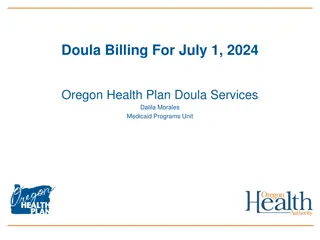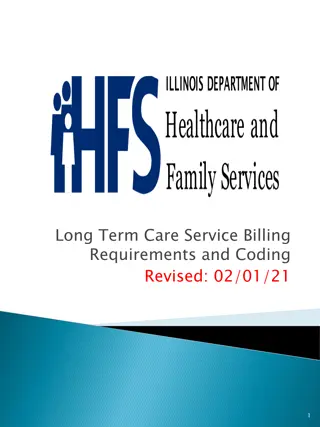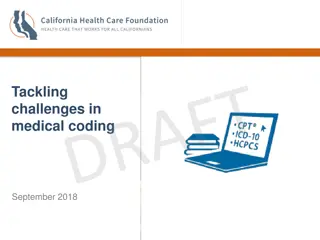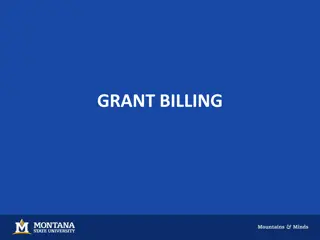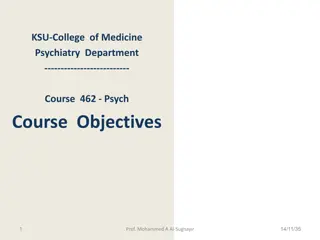Group Psychiatry Billing and Coding Guidelines
Guidelines for billing and coding in group psychiatry sessions, including insights on shared medical visits, ways to bill for groups in primary care, and examples of shared medical appointment guidelines. Learn about billing for group services in primary care settings and understand the considerations for implementing group visits effectively.
Download Presentation

Please find below an Image/Link to download the presentation.
The content on the website is provided AS IS for your information and personal use only. It may not be sold, licensed, or shared on other websites without obtaining consent from the author. Download presentation by click this link. If you encounter any issues during the download, it is possible that the publisher has removed the file from their server.
E N D
Presentation Transcript
Billing for Groups and Connecting with and Paying for Psychiatry Mary Jean Mork July 12, 2018
Shared Medical Visits = Groups Visits Image result for group medical visit
Billing and coding for Group Visits Currently, there are no nationally accepted standards for coding and billing for group visits. Several years ago the American Academy of Family Practitioners (AAFP) sought to clarify Medicare billing requirements and received the following response from the Western regional Medicare contractor: ...under existing CPT codes and Medicare rules, a physician could furnish a medically necessary face-to-face E&M visit (CPT code 99213 or similar code depending on level of complexity) to a patient that is observed by other patients. From a payment perspective, there is no prohibition on group members observing while a physician provides a service to another beneficiary. American Academy of Family Physicians (AAFP). Coding for Group Visits. Retrieved on July 9, 2014 from http://www.aafp.org/practice- management/payment/coding/group-visits.html
Ways to bill for groups in primary care Medical before or after behavioral portion of the group: - Behavioral health delivers group services - bills - Medical provider bills for the shared medical visit - For example: a 90 minute group may have a 99213 for the shared medical visit portion and 60 minutes for the 90853 behavioral group treatment Medical pull out of group: - Medical provider pulls out patients throughout group session bills for medical visit - Behavioral health bills for group, minus time away with provider Medical provider bills for the group (and behavioral health doesn t bill) Ensure that payer allows two services on the same day
Example of Guidelines for Shared Medical Appointments (BC/BS of North Carolina) Patient is an established patient in the practice The group visit is disease or condition specific, but could include multiple chronic conditions Patient attendance is completely voluntary, patients can also have individual appointments Adequate group space is available Appropriate staff are available to facilitate the group Individual as well as group interaction is documented From: Corporate Reimbursement Polices: Group visits (Shared Medical Appointment) Guidelines. Blue
Behavioral Health Group Billing - 90853 Can be an effective and efficient form of treatment for mental health issues. Require that each patient have an Initial Psychiatric Assessment to determine the diagnosis Treatment Plan is developed that includes the group as method of treatment Each Group Treatment note includes a general statement about the group session and an additional paragraph specific to that patient s involvement/progress in relation to that group session. All other Progress Note expectations apply.
Common Billing Practice Document clearly individual services provided to each patient as well as the services provided to the group as a whole Emphasize the medical management component Use medical E/M code 99213 (rarely 99214) If more than one clinician billing (i.e., a physician and psychologist) differentiate services provided to avoid duplicate billing Patient education is not directly reimbursed under current system, except in specific cases such as diabetes self management education (DSME) by a certified diabetes educator (CDE) References: Putting Group Visits into Practice in the Patient Centered Medical Home. Stephanie Eisenstat MD, Karen Carlson MD and Kathleen Ulman PhD. Massachusetts General Hospital 2014 Putting Group Visits into Practice: A Practical Overview to Preparation, Implementation and Maintenance of Group Visits at Massachusetts General Hospital. 2012, Eisenstat, Lipps Siegel, Carson and Ulman. 2012.
Recommended Next Steps If setting up groups that include both medical provider and behavioral health clinician: Contact payers to determine if the behavioral portion of the group visit can be directly billed by the BHC http://www.e-meds.com/how-code-grup-visit-or-shared-medical-appointment Contact Medical Director of the Medicare carrier : Paul Hughes 803-264-770 Paul.hughesmd@eds.com Inform each insurer in advance of your intent to begin furnishing group visits and how you plan to bill for them. American College of Physicians. https://www.acponline.org/practice-resources/business-resources/office-management
References for Group Visits 1. Shared Medical Appointments: A Recipe for Success (Cleveland Clinic)https://www.youtube.com/watch?v=9_4T-Z6tWNk 2.Group Visit Coding (American Academy of Family Physicians) http://www.aafp.org/practice-management/payment/coding/group-visits.html 3.Specific Payment Codes for the Federally Qualified Health Center Prospective Payment System (CMS) https://www.cms.gov/Medicare/Medicare-Fee-for-Service- Payment/FQHCPPS/Downloads/FQHC-PPS-Specific-Payment-Codes.pdf or search for FQHC PPS 4-26-16 4. Medicare Benefit Policy Manual , Chapter 13 - Rural Health Clinic (RHC) and Federally Qualified Health Center (FQHC) Services (CMS) https://www.cms.gov/Regulations-and- Guidance/Guidance/Manuals/Downloads/bp102c13.pdf or search for Medicare Benefit Policy Manual, Chapter 13, 1-15-16
Connecting with and Paying for Psychiatry Image result for sharing Image result for trust
Comparison of Employment Arrangements for Co-located and Integrated Practice Level of Collaboration all expenses space Co-located Practice Psych schedules Separate records Separate service Partially Integrated Psych covers Practice offers Practice offers space and scheduling Psych bills Separate records Streamlined referral and scheduling process Communication with releases Practice employs Psych bills Psych bills Psych schedules Separate records Some communication with releases Practice bills Same record Shared responsibility for schedule Streamlined processes Communication without need for releases Practice bills Same record Shared responsibility Streamlined processes Improved coordination and communication Working toward becoming part of primary care team Practice bills Same record Shared responsibility Streamlined processes Solid communication and coordination Part of primary care team Level 3 and 4 Psych bills Separate record Coordinated care Streamlined referral and scheduling process Releases part of routine Connected to primary care team Level 5 Fully Integrated Level 6
Levels of Integration with Psychiatry Level Payment Considerations Minimal Collaboration I Little payment consideration Coordinated Basic Collaboration at a distance II Preferred provider benefit Collaborative Care contract Basic Collaboration on site III Separate billing but referrals facilitated Collaborative Care contract Co-Located Close Collaboration Onsite IV Space given to separate psychiatry practice Collaborative Care contract Close Collaborative Approaching Integrated Practice V Psychiatry services billed by the practice Collaborative Care Code functions Integrated Full Collaboration in a Transformed Integrated Practice VI Psychiatry services billed by the practice Collaborative Care Code functions Adapted from: A Standard Framework for Levels of Integrated Healthcare. National Council for Community Behavioral Healthcare 2013
Methods of paying for psychiatry services Offer space in practice. Maintain separate systems Charge rent in practice. Ensure patient referrals Consider payers Provider based and facility fee Plan to contract for psychiatry (or employ psychiatry) - Define functions e.g. direct service, consultation, connection to team, patients to be seen, care team coordination - Create proforma cost vs. service delivery and productivity expectation - Consider Collaborative Care Codes and payment for psychiatry services
99492 Initial Psychiatric Collaborative Care Management 70 minutes in the first calendar month Outreach to and engagement in treatment of a patient Initial assessment of the patient using validated rating scales Development of an individualized treatment plan - Psychiatric consultant review & modifications Image result for consultation
99492 Initial Psychiatric Collaborative Care Management - continued 70 minutes in the first calendar month Registry for tracking patient follow-up and progress with appropriate documentation Weekly caseload consultation with the psychiatric consultant Brief interventions using evidence-based techniques - Such as behavioral activation, motivational interviewing, and other focused treatment strategies. Image result for registry
99493 Subsequent psychiatric collaborative care management First 60 minutes in a subsequent month of behavioral health care manager activities. Must include: Tracking patient follow-up and progress Weekly caseload review with psychiatric consultant Coordination with PCP and any other treating provider Psychiatric consultant review & modifications
99493 Subsequent psychiatric collaborative care management First 60 minutes in a subsequent month of behavioral health care manager activities. Must include(continued): Brief interventions using evidence based treatments Monitoring of patient outcomes using validated rating scales Relapse prevention planning Preparation for discharge from active treatment
99494 (originally G0504) Additional psychiatric collaborative care management Each additional 30 minutes in a calendar month of behavioral health care manager activities listed above. Listed separately and used in conjunction with 99492 and 99493
Blue Cross Blue Shield of Rhode Island policy for Behavioral Health Integration Services 2/20/18 https://www.bcbsri.com/sites/default/files/polices/2018%20Behavioral%20Health%20Integration%20Services.pdf Job description for the behavioral health care manager demonstrating a collaborative integrated relationship with the team - with formalized training or specialized education in behavioral health Plan for identification, outreach and engagement of patients directed by a primary care provider Initial assessment, including administration of validated scales and resulting in a treatment plan Evidence of a compact/contract with a psychiatric consultant Written workflows documenting: Psychiatric consultation/referral process Evidence based treatment interventions to be used Plans for ongoing collaboration and coordination with PCP and any other treating providers; Relapse prevention planning and preparation for discharge from active treatment. Demonstrated use of a registry for tracking patient follow up and progress Evidence of weekly caseload review with psychiatric consultant Evidence of monitoring of patient outcomes using validated rating scales
Psychiatrist (or Psych NP) Employed by or contracted to the PCP - Does not necessarily have to be a Medicare provider Advises regarding: - Diagnosis - Recommendations to improve or adjust treatment - Interactions between behavioral health care and medical care Facilitate referral for direct psychiatric care when indicated Can deliver face to face service with patient Consultation can be delivered remotely
Codes and Times Behavioral Health Integration Coding Summary Payment/Pt (Non- Fac) Primary Care Settings Payment/Pt (Fac) Hospitals and Facilities Behavioral Health Care Manager or Clinical Staff Threshold Time Assumed Billing Practitioner Time BHI Code CoCM First Month (99492) 70 minutes per calendar month 30 min $142.84 $90.08 CoCM Subsequent Months (99493) Add-On CoCM (Any month) (99494) General BHI (99484) 60 minutes per calendar month 26 min $126.33 $81.11 Each additional 30 minutes per calendar month At least 20 minutes per calendar month 13 min $66.04 $43.43 15 min $47.73 $32.30 BHI Initiating Visit (AWV, IPPE, TCM or other qualifying E/M) Usual work for the visit code N/A Usual Usual
Billing Billing is by calendar month Billing can happen any time during month - Once minimum time has been spent on collaborative care Medical provider must see patients not seen within a year of service - Could be month preceding start of Collaborative Care - Do not need to see patient during ongoing months of Collaborative Care Co-pay is required, but could be covered by Medigap plan
Implementing the Integrated Care Model - AIMS Center Lay the foundation Plan for the Clinical Practice Change Build your Clinical Skills Launch your care Nurture your Care Image result for behavioral health
Bibliography / Reference Psychiatry Consultation 1. Raney, Lori E. Integrated Care: Working at the Interface of Primary Care and Behavioral Health. American Psychiatric Publishing. 2015 2. Robinson, Patricia J., Reiter, Jeffrey T. Behavioral Consultation and Primary Care: A Guide to Integrating Services. Second Edition. Springer International Publishing. 2016 3. Martini, Richard, et al. Best Principles of Integration of Child Psychiatry into the Pediatric Health Homes. American Academy of Child and Adolescent Psychiatry. Approved by AACAP Council June 2012. www.aacap.org 4. Goodrich, David E. et al. Mental Health Collaborative Care and Its Role in Primary Care Settings. US National Library of Medicine. NIH. Curr Psychiatry Rep 2013 Aug 15 (8):383 5. Raney, Lori E. Integrating Primary Care and Behavioral Health: The Role of the Psychiatrist in the Collaborative Care Model. American Journal of Psychiatry. Vol 172, Issue 8, August 2015
References for Collaborative Care 1. https://aims.uw.edu/collaborative-care/implementation-guide The AIMS Center. University of Washington Psychiatry and Behavioral Sciences 2. Frequently Asked Questions about Billing Medicare for Behavioral Health Integration (BHI) Services. March 9, 2017 3. CMS CoCM Fact Sheet: https://www.cms.gov/Medicare/Medicare-Fee-for-Service- Payment/PhysicianFeeSched/Downloads/Behavioral-Health-Integration-Fact- Sheet.pdf 4. https://www.cms.gov/Medicare/Medicare-Fee-for-Service- Payment/PhysicianFeeSched/ 5. Behavioral Health Integration Services. CMS. Medicare Learning Network. ICN 909432 May 2017.
Contact Mary Jean Mork, LCSW VP for Integrated Programming Maine Behavioral Healthcare - a member of MaineHealth morkm@mmc.org 207-662-2490 Presentation offered through the Collaborative Family Healthcare Association www.cfha.net




